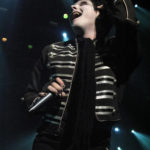On the persistent theme of death in the band’s music: “It comes from being raised Catholic. Your first experience with church is really scary – it’s all about damnation and death. And the first time I was really taught about death wasn’t really from my parents or TV, it was from a nun and it was really terrifying way to hear it. I became so obsessed with death at that point I didn’t want to lose anybody, and risk the potential of them burning in hell for eternity. I think that’s where it comes from and I think the acceptance of it eventually lead me to want to keep writing about it.”
On the platinum dye job he sported at the beginning of “The Black Parade”: “I definitely don’t miss that haircut. When I was wearing all black clothing and just kind of normal stuff it looked really cool – it actually looked very ‘70s – but then in the context of wearing the uniform and dolling up it made it way too squeaky clean for me, and I really started to dislike it and I didn’t feel like myself. I don’t miss it and I won’t go back to it, (but) it served its purpose for what I needed.”
On “Kill All Your Friends,” a Pixies-esque “Black Parade” B-side): “If I regret anything about ‘The Black Parade’ it’s not putting on ‘Kill All Your Friends.’ It was falling in the middle and the record, to us, wasn’t moving fast enough because there’s a lot of mid-tempo and no super breakneck speed songs. It was not that short of a song, it’s like 5 minutes, so it was kind of dragging the record; I think if we’d made a shorter album, it would have been a perfect song to have on it. There’s a part of me that wishes we would have saved it for the next record, too. It’s a really special song to me and it as actually one of the riskiest songs we did because we didn’t know if people were going to get it. I’ll tell you what that song is specifically about: It’s about growing up, living, working and dying in the same place, basically the fear that I’ve had my whole life. And going to what I refer to as ‘high school reunion funerals,’ so to speak, where you really only see people from your adolescent years at funerals, and I never heard a song about that specifically. You know, so it was just about kind of being from New Jersey.”
SAM BAYER
From the second we shook hands I felt how intense this guy was. I think I was so nervous to meet him that I gave a lame half-handshake because I kind of missed his hand. I told him I loved his work, he told me he loved our work. I had a feeling something was coming around the corner.
Almost a month later we met and he came and listened to what we had worked on. He instantly got it. He was instantly excited. He picked out every single influence and said: ‘You guys are throwing down the gauntlet with this record…I want the videos to do the same thing…they have to.’
Sam got the concept of The Black Parade on so many levels. He got it metaphorically, culturally, cinematically. He even picked out the influences of certain films like ‘City Of Lost Children,’ Delicatessen,’ ‘Metropolis,’ and ‘The Cabinet Of Dr. Caligari.’ a film we had been trying to capture since we made our first video for ‘Vampires Will Never Hurt You.’
The comic scratches a certain itch where I’m just drawing and dreaming up stuff. I don’t know for sure – I mean, The Black Parade satisfied the itch that I had to make that album at the time. Coincidentally enough, we made Black Parade right after I had submitted the pitch for Umbrella, but it was just in stasis at that point. But there are differences clearly – for The Black Parade, I was able to sit and dream up the plot lines, the costumes, the videos, the stage setup – everything that went into that. With Umbrella, I get to do that every month.






